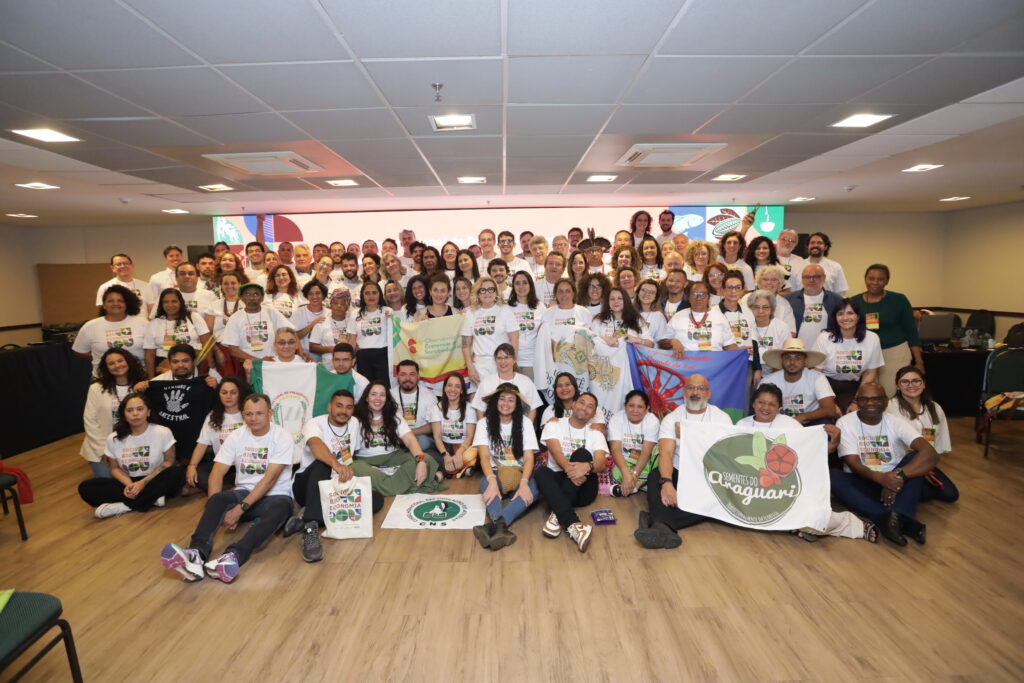
Credit: Miracena.
Private investments in bioeconomy, policies on biofuels, and the Brazilian government’s pilot projects in socio-bioeconomy were among the topics discussed at the latest regional meeting of the UK Pact (Partnership for Accelerated Climate Transitions) on September 19, in which the Arapyaú Institute participated. The initiative is a program of the United Kingdom government that supports developing countries in accelerating climate transitions and decarbonization through capacity building and project funding.
The meeting discussed progress in the development of the National Bioeconomy Development Plan (PNDBio), a Federal Government initiative that has been under development since the beginning of the year and will be presented at COP30. The plan aims to consolidate a range of public policies designed to transform Brazil’s biodiversity into a driver of sustainable economic growth based on preserving the standing forest.
According to Vinicius Ahmar, Programs Director at the Arapyaú Institute, some of the key components of PNDBio will be the strengthening of the forest economy and socio-biodiversity, along with the inclusion of Indigenous peoples, traditional communities, and smallholder farmers in market participation. “The process of developing the agendas to be included in the plan was built collaboratively, with missions and strategic actions designed collectively,” he highlights.
One of the proposals under discussion is the model of Sociobioeconomy Development Hubs, which aim to create local cooperation networks that facilitate market access, support production chains, and foster the sustainable development of communities. For Ahmar, this integrated framework connects territorial coordination, innovation systems, and knowledge generation — key points to overcome the sector’s main bottlenecks.
The PNDBio text also proposes measures to address long-standing challenges, such as integrating public policies and financial instruments, and mitigating social, environmental, and climate risks — all based on existing Brazilian legislation, such as the Forest Code.
Another highlight of the plan is the proposal to create the National System of Information and Knowledge on Bioeconomy (SNICBio), designed to gather and make available official data about the sector. The system is expected to become a reference for public policies, business strategies, investment attraction, and results monitoring.
“We are making progress in structuring the sociobioeconomy as a strategic component of the national bioeconomy, with solutions that emerge from the communities themselves,” summarizes Ahmar.
Atlantic Forest
The Federal Government has defined the Sociobioeconomy Territories (TSBio) as priority areas for investment within this agenda. One of these territories is Southern Bahia, home to traditional peoples and communities, smallholder farmers, and socio-productive organizations, with strong activity in the production of cocoa, bananas, and other fruits such as cupuaçu.
On October 2, the Southern Bahia Regional Development Agency (ADR Sul da Bahia), with support from the Ministry of the Environment, UK Pact, and the Arapyaú Institute, held a regional workshop in Ilhéus to discuss the feasibility of the Atlantic Forest Socio-bioeconomy Development Hub. The meeting brought together 86 institutions, 70% of which work with agroforestry systems. The main challenges identified were financial sustainability, infrastructure, and access to credit and markets.
ADR played a key role in gathering data for the territorial diagnosis, developing a governance proposal, and organizing the participatory workshop. The next step will be to systematize a report consolidating the results and returning the collectively built proposals to participants. “In this feedback stage, we’ll present the main insights, criticisms, challenges, and opportunities identified in the territory,” says Mariana Sales, Executive Secretary of ADR Sul da Bahia.
Two more workshops are planned for the pilot project of the Socio-bioeconomy Development Hubs in the Cerrado and Caatinga biomes, both supported by Arapyaú.
The National Sociobioeconomy Strategy has technical support from a consortium of organizations composed of the Brazilian Business Council for Sustainable Development (CEBDS), the Arapyaú Institute, The Nature Conservancy (TNC Brazil), and the Brazilian Coalition on Climate, Forests, and Agriculture, with financial support from the UK Pact project.